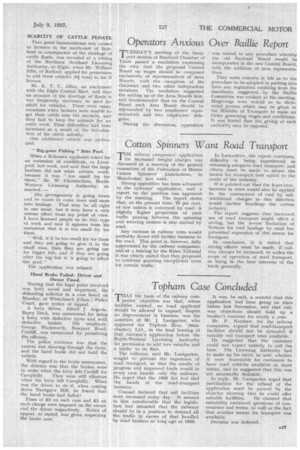Topham Case Concluded - r -IAT the basis of the railway com
Page 27

If you've noticed an error in this article please click here to report it so we can fix it.
panies' objection was that, where facilities existed, no toad applicant should he allowed to expand, despite an improvement in business, was the assertion of Mr. J. Lustgarten, who appeared for Topham Bros. (Manchester), Ltd., in the final hearing of that concern's application before the North-Western Licensing Authority for permission to add two vehicles and a trailer to its fleet.
The railways, said Mr. Lustgarten, sought to prevent the expansion of road transport, so that the results of progress and improved trade would in every case benefit only the railways. He urged that the 1933 Act had tied the hands of the road-transport industry.
Counsel declared that rail facilities were, increased every day. It seemed to him unbelievable that the legislature had intended that the railways should be in a position to demand all the traffic in excess of that handled by road hauliers so long ago as 1933. It was, he said, a scandal that this application had been going on since before last November, and that railway objections should hold up a haulier's business for nearly a year.
Mr. P. Kershaw, for the railway companies, argued that road-transport facilities should not be extended if suitable rail transport were available.
He suggested that the customer could not expect entirely to call the tune. The Licensing Authority had to make up his mind, he said, whether it were reasonable for customers to have road vehicles available at short notice, and he suggested that this was -not necessarily desirable.
In reply, Mr. Lustgarten urged that justification for the refusal of the application must be proved by the objector showing that he could offer suitable facilities. He claimed that suitability embraced questions of convenience and terms, as well as the fact that another means for transport was available.
Decision was deferred.




















































































